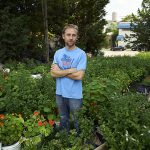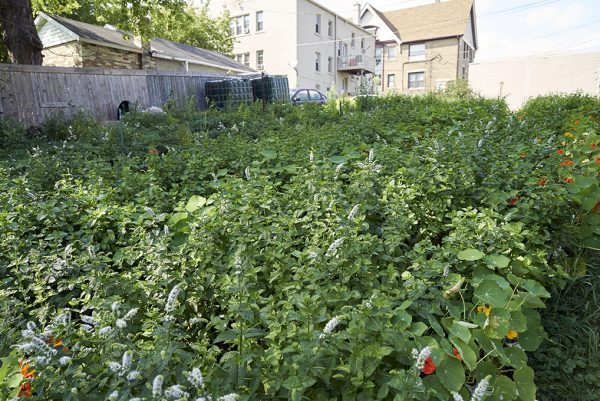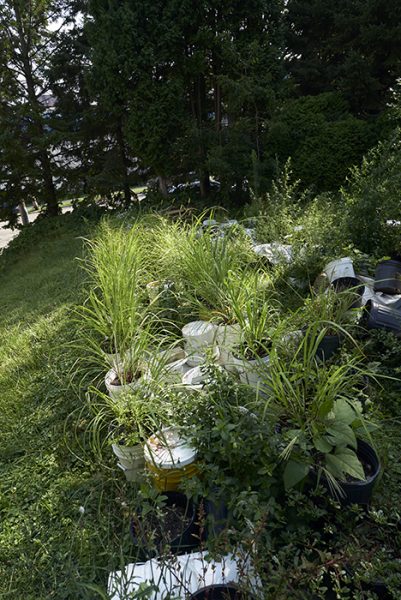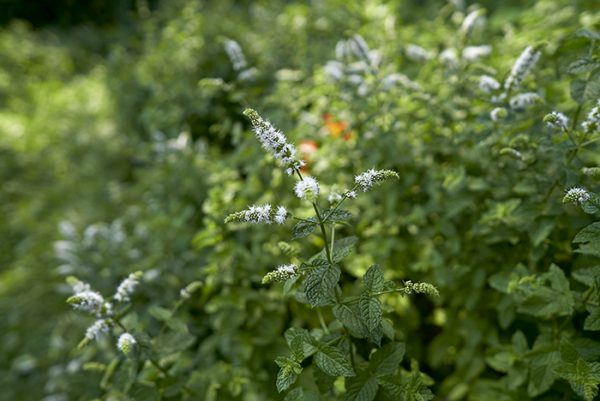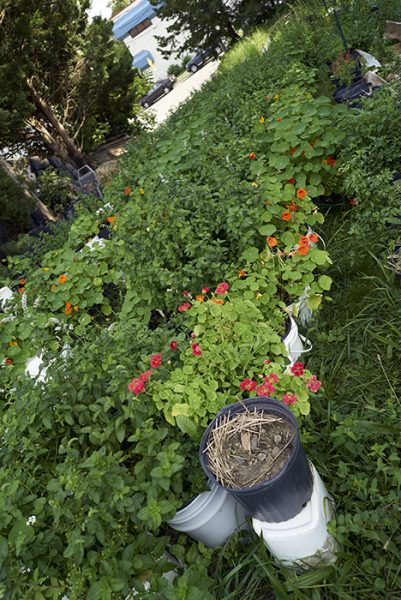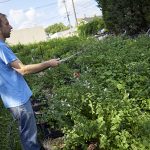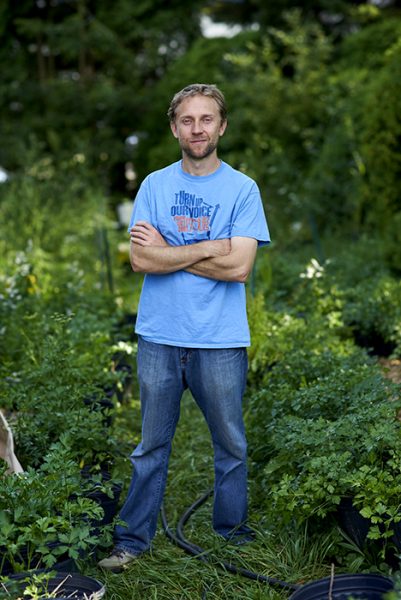For much of modern history farming has been perceived as a rural venture, and not something that would be happening inside city limits. For a variety of reasons though, that perception, and reality have been slowly changing. “Urban agriculture” and “urban farms” are steadily becoming more common as people seek out fresh food with less mileage between farmer and consumer.
Nick DeMarsh is an urban grower, working under the business name “Farm a Sea of Green.” He grows herbs on a small farm in the Riverwest neighborhood, delivering his herbs to restaurants and markets by bicycle, within 24 hours of the herbs being harvested. I met Nick at the Milwaukee Public Market, as I was eating breakfast, and he was talking to the restaurant manager about providing herbs to them. When I heard that he was growing locally, and delivering by bike, I had to learn more about his biz!
Nick has been growing at his current plot for about three years, though he’s been selling commercially about five years. He grew up in Milwaukee’s suburbs, but found an interest in urban ag, and has been pursuing that in quite a few ways. He started out volunteering, then working, at Growing Power. After Growing Power, he became a substitute teacher at Milwaukee Public Schools. He says about that transition, “when I was at Growing Power, I learned about how hard of work farming can be. When I headed for sub-teaching, people thought it would be much harder, but that didn’t compare at all to pushing wheelbarrows around Growing Power!”
After MPS, he spent time at the 16th Street Community Health Center. While he kept an interest in urban ag, he wasn’t sure farming was his vocation, but, “I”m probably like a lot of folks talking about the issues we face; I keep coming to back to ‘this is what I need to be doing to help’.”
He’s now doing a fellowship at Groundwork MKE, while pursuing an urban studies masters degree at UW-Milwaukee. With Groundwork MKE, Nick’s busy creating an urban farmers’ union, leading the Young Farmers group, teaching a food-systems course, and with the Urban Ecology Center, is planning a six-week lecture course about food systems on a macro scale. In talking with Nick, it’s apparent that he sees urban growing as serving more purposes than just fresh basil in a mojito.
Nick sees his farm as a bit of a demo project, showing that urban ag CAN be commercially viable, can serve small- and medium-sized businesses well, and can have a valuable environmental impact on the neighborhood it’s located in. “The land really serves in a few ways – not just for local food, but to also protect and enhance our environment,” Nick says.
His farm is on a hillside, with a garage near the top.The downspouts on the garage are connected to a few large water tanks, where Nick collects the rain water, and then gravity gives the pressure he needs in hoses for watering the garden. That effort is keeping hundreds of gallons of water out of the sewer system. The garden acts as a “carbon sink”, and the green space absorbs heat from the sun instead of reflecting it, in turn keeping the neighboring houses a bit cooler.
Nick has been mostly happy with the City’ of Milwaukee’s interest in urban ag. He’s happy to say that a few policies/ordinances have been changed in ways favorable to urban growing. Still though, while the city IS interested in green infrastructure, he’d like to see them talking more about how urban ag factors into that infrastructure.
He says, “…the bigger pic is how climate change relates to all this. There’s a lot of talk and awareness about what needs to happen to transform our energy grid, and how urban ag can help with that – stormwater diversion, carbon sinks, keeping the neighborhood cooler – it’s not just growing greens, it addresses many challenges. Policy makers need to support solar panels, sure, but urban ag, too, to address climate change.”
Nick’s crops (mint, basil, parsley, and others) have been popular at places like Amilinda, the Beerline Cafe, Riverwest Co-op, and Outpost Natural Foods. He says that in the search for new clients, he’s looking for the right relationships, not wanting to force his product into a business: “I’m always looking for the unmet demand, rather than being a farm trying to crowd out another farm…”
Nick is working darn hard to spread the news about urban ag, and to show people how it can be done successfully. To that end, he is also planning a Farmers’ Union “Farm Tour” for this Fall, to introduce consumers and restaurants to urban farms in the area. As he said, “I can’t succeed unless other urban farmers are succeeding.”
